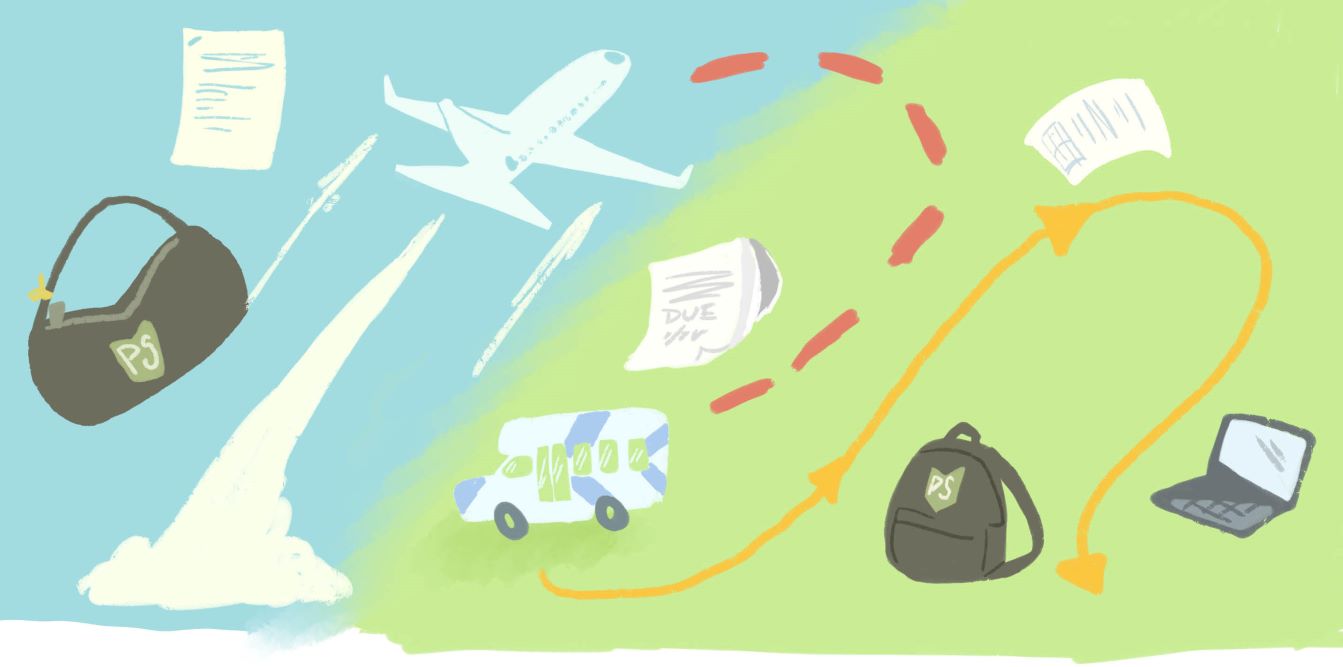For college students, time management is an important part of staying on track and accomplishing goals. The academic rigor of college can be daunting, and creating a balanced schedule is imperative. For many students, work, family and other obligations are thrown into the mix, increasing stress levels and making sleep and rest a valued commodity. But for student-athletes at universities across the country, another factor presents itself: constant traveling—no pun intended for basketball fans.
Balancing schoolwork and athletics can be challenging, but there are ways student-athletes can harmoniously combine the two by utilizing a number of resources and strategies.
How does a full-time student-athlete manage their responsibilities? Freshman soccer player Sienna Higinbotham and sophomore cross country runner Josh Snyder shared their thoughts.
Higinbotham praised Portland State for how it handles the schedules of student-athletes. “They’re great about it,” Higinbotham said. “They give you a paper to give to your professors which excuses you for the class period, but at the same time, you work with the professor balancing how this will affect your studies. A lot of the lectures I’ve missed were posted [online] so I can still take notes.”
Snyder echoed Higinbotham’s feelings toward technology and its ability to increase efficiency outside of the classroom.
“It’s all about keeping on top of things,” Snyder said. “Our academic advisor prints out sheets that tell our professors when we’ll be gone. Professors will sometimes play hardball and make sure you know that if you’re not going to be there in person, you’re still expected to turn everything in at the same time.”
According to the National Collegiate Athletic Association rules, student-athletes need to be enrolled in a full-time schedule of at least 12 credits in order to maintain eligibility. However, academic schedules can be strategically lightened during the term in which the student-athlete is traveling for their sport.
“Usually we try to keep it light during the season; 12 credits during fall term then up to 16 in the winter and spring,” Higinbotham said. “Our academic advisor works with us to figure out which classes are best to take during the season, because you generally don’t want to take your most difficult classes at that time.”
Because student-athletes are typically on a similar athletics schedule, it is fairly common for athletes within the same major to be taking classes together. This allows student-athletes with overlapping schedules the opportunity to study together and collaborate on projects and assignments.
“I noticed that a lot of athletes, even from separate teams, take classes together if they have the same major,” Higinbotham said. “Over the summer, all the incoming freshmen like myself were taking the same intro class together.”
“I have several teammates with the same major as me who are in the same classes I am,” Snyder said. “One girl who is on the team with me, we study together at school and sometimes in the airport. When teammates have the same classes, we definitely tend to form groups.”
Despite the accommodations student-athletes are provided to help balance their academic and athletic schedules, the physical and mental fatigue associated with regular travel is still something they must cope with.
“As someone who is not a ‘morning person,’ it’s hard to get up and make those early flights before dawn,” Higinbotham said. “You’re exhausted. Even when you’re not on the road, you’re still tired from practices and workouts. Our coaches and trainers emphasize getting enough rest. To me, naps are important, even if you can only manage 30 minutes or so at a time.”
“Last year, we essentially had an entire week straight of travel,” Snyder said. “Coming back after all those days without class, it can be difficult to get back in your routine—it definitely takes some adjusting.”
While acknowledging the challenges, both athletes also noted the resources available.
“The coaches have us do six hours of study hall a week,” said Higinbotham. “That helps us get a lot of our homework done. Even if you don’t necessarily have a lot to do it helps put you in a situation where you can’t procrastinate. It’s nice to have a place where it’s just you and your homework.”
“Don’t miss anything that you don’t have to,” Snyder said in regards to the resources available. “The testing center is a big help though. You can schedule a test with them if you miss one due to travel. There’s a lot of resources on campus.”
With university faculty and coaches working together to help students stay on track, the question is: Who do student-athletes find to be more strict about academics—their professors or their coaches?
“The coaches are always on top of us about our academics,” Snyder said. “You have to be a student first because if you’re academically ineligible you can’t compete anyway. If we’re not on top of our assignments they make sure we’re in study hall. Having the coaches keep you accountable is very helpful.”
Higinbotham, however, said, “The professors!”
